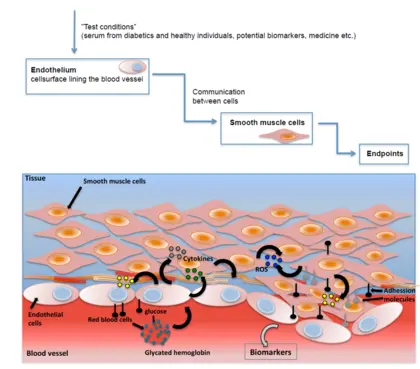Establishment of an in vitro model for diabetic atherosclerosis (project is finished)
With these studies we focus on the development of a model, an artificial blood vessel, mimicking the interaction between blood, the vascular endothelium and the smooth muscle under diabetic conditions.
Patients with diabetes are massively disposed to develop atherosclerosis, resulting in stroke and myocardial infarction. As the number of patients with diabetes is predicted to increase to more than 550 million within the next 20 years, it is crucial to understand why diabetes accelerates the development of atherosclerosis.
Our research has focused on biomarkers of atherosclerosis in patients with diabetes, primarily by analysing blood samples from large patient cohorts, using an epidemiological approach. So far, we have identified a number of promising biomarkers, which appears to be involved in the development of atherosclerosis. The next step is to perform these mechanistic studies, with the purpose of clarifying how these biomarkers may participate in the processes leading to atherosclerosis.
Through this model we aim to search for a better understanding of the mechanisms resulting in diabetic atherosclerosis, a knowledge that may improve its treatment and prevention. We believe that success in the studies may also provide novel insight and provide a better understanding of other diabetic complications. Importantly, our model may also be used to study new biomarkers and therefore, we believe it has a large potential within the field of atherosclerosis also in future research.
Articles
- This project didn't result in an article
Newsletter
Sign up for our newsletter - don't miss information about our annual symposium etc.
